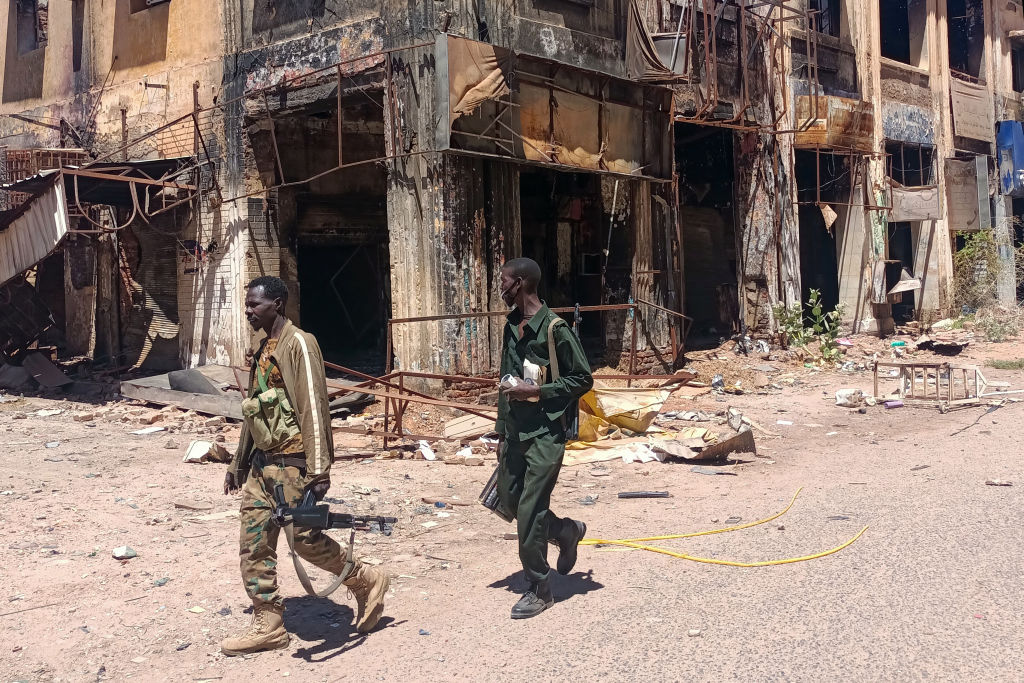In a video posted to social media, a Sudanese soldier dragged a man with a broken leg into a ditch on the edge of the city of Omdurman and shot him to death. He then used a long knife to cut off the man’s head while his companions cheered.
That execution and desecration is one of several incidents in which members of the Sudanese Armed Forces (SAF) and their allied militias are accused of committing war crimes as they retake land formerly held by the opposing paramilitary Rapid Support Forces (RSF).
After retaking Khartoum and Omdurman from the RSF in March, Sudanese soldiers and their allied militias sought out members of the Darfuri and Nuba communities as well as South Sudanese residents of Khartoum and killed them, according to the Sudan War Monitor. All three groups have been accused of working with the RSF.
“War crimes of this kind have taken place since the beginning of the war, but the number of victims has increased recently as large amounts of territory have changed hands,” researchers with the Monitor wrote recently.
The Omdurman beheading was the second such act by SAF soldiers verified by Monitor researchers since the civil war began. In 2024, Sudanese soldiers beheaded two civilians.
“After that incident, the Sudanese army claimed it would investigate, but no subsequent actions or arrests were announced in connection with the inquiry,” Monitor researchers reported. Since the start of Sudan’s war between the SAF and RSF, both sides have been accused repeatedly of murdering civilians, executing captured fighters and mutilating dead bodies, among other war crimes.
In many cases, the crimes have been photographed or filmed and uploaded to social media. Researchers believe those published accounts are only a small portion of all the war crimes being committed. In one SAF video made after the military recaptured Khartoum, soldiers executed a man dressed in civilian clothes in front of a cafe while some in the crowd cheered, according to the Monitor, which used the video to identify the location of the execution.
In another video, Sudanese Soldiers executed six captive men on the bank of the Nile in an area believed to be south of Khartoum. The most recent war crimes are part of a pattern extending to the earliest days of the war that broke out on April 15, 2023.
In June 2024, the Monitor reported that Sudanese Soldiers had killed three captured RSF fighters, mutilated their bodies and dumped them into a Sennar state canal connected to the Blue Nile. One prominent SAF social media influencer, posted on X that the RSF fighters would be “food for the crocodiles.” His comment was later removed.
In August 2024, Human Rights Watch (HRW) reported on an incident in which Sudanese soldiers blindfolded three shirtless prisoners who appeared to be children, pushed them into a pit and shot them repeatedly.
“They are committing atrocities without fear of any consequences,” HRW researchers wrote about both sides in their report.
The 2024 HRW report noted that researchers analyzed 20 videos and one photograph going back to 2023. In most of them, both killers and victims were dressed in military uniforms. In a few, victims were dressed as civilians. In all of them, the victims were unarmed.
Similar incidents have taken place in Khartoum, along with the states of al-Gezira, North Kordofan and West Kordofan — all places where fighting has intensified as the national forces seek to retake areas conquered by RSF fighters early in the war.
Since Sudanese national forces retook Wad Madani, the capital of al-Gezira state, soldiers and militia members are suspected of killing at least 200 people, including prisoners of war, members of the Kanabi ethnic group and citizens of South Sudan. The dead were a mix of civilians and fighters.
While there were no reports of mutilations or desecrations of those bodies, researchers note that such behavior has become widespread. While Sudanese law doesn’t ban desecrating bodies in wartime, international law does.
“Despite this, disrespectful treatment of the dead has been disturbingly commonplace throughout the war,” Monitor researchers wrote. “These cases suggest a broader pattern of disrespecting the dead and mutilating bodies, which has become accepted and popularized among Army troops.”

